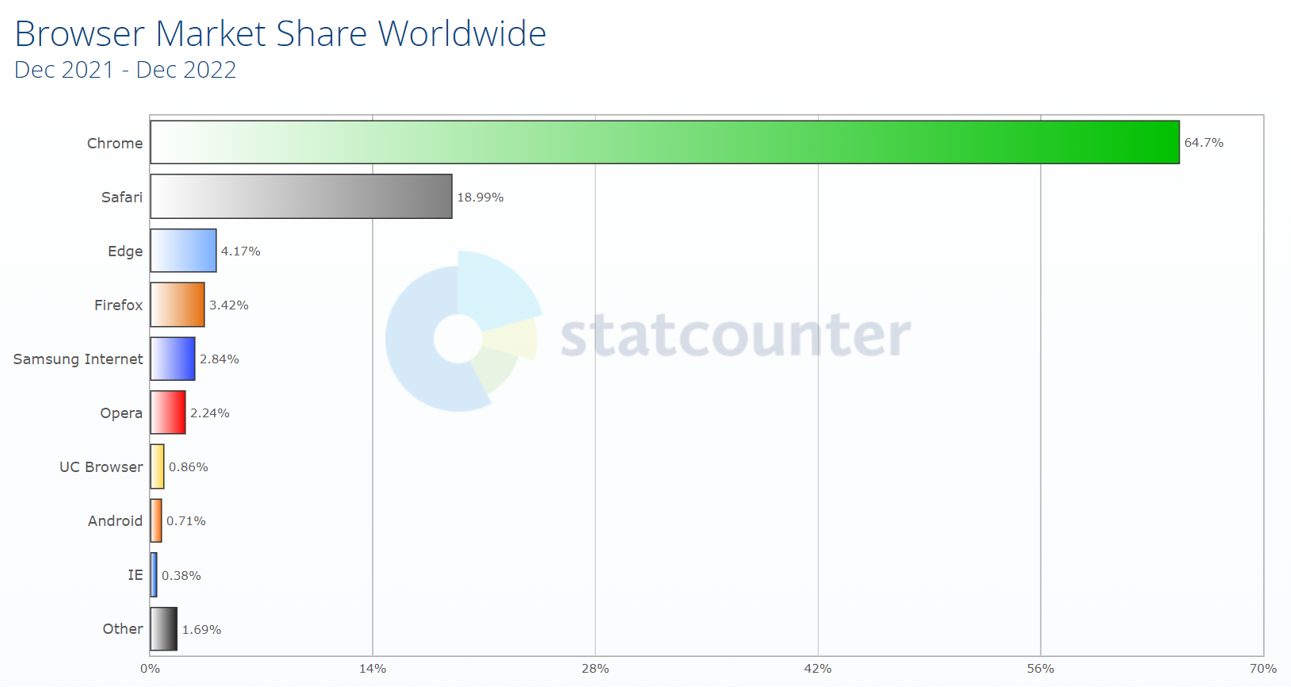Share this Post
The development of easy-to-use programs for transferring information over telephone lines was historically challenging until the creation of the first internet browser by British scientist Tim Berners-Lee in 1990. This browser allowed for the linking of text documents/content over a public network and marked the start of the explosion of the internet. The browser battle between Netscape and Microsoft began in 1995 with the release of Microsoft’s Internet Explorer window, sparking fierce competition to create better products. During the late 1990s and early 2000s, several competitors, such as Opera, Safari, and Google Chrome, entered the browser market. Microsoft Edge eventually replaced Internet Explorer in 2015.
Browsing World since then
In 1998, Google was founded as a research company. Ten years later, it hired some staff from Mozilla and developed a web browser, Google Chrome. Although its initial release saw a slow uptake with just 1% of the market, Chrome has since become the world’s most popular browser, with approximately 64% of internet users worldwide.
Source: Statcounter, Browser Market Share Worldwide – December 2022
The competition between tech companies has now extended into Artificial Intelligence, as seen in the popularity of the recently developed language model, ChatGPT. Created by the non-profit organization OpenAI, ChatGPT is designed for conversational interactions and has garnered significant attention on social media. Within five days, it amassed over a million users, surpassing the adoption rate of significant platforms such as Meta (formerly Facebook) and Netflix. This trend reflects the rapid adoption of technology among users today, with advancements such as the Internet and Cloud technologies taking decades to achieve similar usage levels.
Artificial intelligent chatbots are popular globally, no longer only due to the fact they speak very nicely with people but also because they help small and large businesses to save their time and resources by achieving better results in many ways. Similarly, ChatGPT is trained on a vast dataset comprising conversations and other online content. It utilizes a machine learning technique called Reinforcement Learning from Human Feedback (RLHF) to refine its responses over time. Thousands of users have shared their experiences with ChatGPT, showcasing its capabilities in answering questions, writing articles, debugging code, composing poetry and song lyrics, summarizing essays, and even assisting with homework assignments.
Every technology has its pros and cons; therefore, with the launch and popularity of ChatGPT, many questions have been raised, from cyber security departments to education and training institutes.
Cyber Security Implications:
Check Point Research and others have noted that ChatGPT can write phishing emails and malware. Especially when combined with OpenAI Codex.
Educational Implications:
Joanna Stern with The Wall Street Journal explained the cheating in American high school English with the tool by submitting an AI-generated essay. Professor Darren Hick of Furman University noticed ChatGPT’s “style” in an exam paper submitted by an actual student. An online GPT detector claimed and resulted as the document is 99.9% likely to be computer-generated. However, Hick had no hard proof. After the incident, the student confessed to using GPT when confronted and failed the course.
As of 4th January 2023, the New York City Department of Education has restricted access to ChatGPT from their school internet & devices.
Social Implications:
As ChatGPT is trained from writing codes to writing lyrics for a song or poem, Social media users are highlighting that this technology can be a source of income for individuals. Any non-technical person can write long codes and provider apt justification using ChatGPT. It writes food recipes, slogans, SOPs, creates games, you name it, and can be made.
AI Enterprises & their thoughts
On the other hand, enterprises / AI platform providers are stating that ChatGPT can’t replace Enterprise Conversational AI Platforms. An article by Kore.AI in Dec’22 elaborates, “While ChatGPT and conversational AI platforms share some similarities, they are designed to serve different purposes and are not directly interchangeable.”
Given how these large language models can provide an apt solution to many questions, is it far-fetched that a company like OpenAI, Google, or Microsoft would one day replace conventional search with an AI chatbot? Some on Twitter have already declared that ChatGPT will be the next Google. On 17th Jan 2023, Microsoft announced to make Azure’s cloud service with OpenAI’s ChatGPT accessible/available for their enterprise customers.
The situation in which a question-and-answer chatbot may one day replace Google is scary to those making a living as search marketing professionals. It has sparked discussions on online forums or communities that if the popular search engines moved away, the inclination would be toward chatbots. Having tested ChatGPT for the initial few days, I agree that the fear of search being replaced with a chatbot is not unfounded. Technology still has a long way to go. However, it’s possible to envision a hybrid search engine and chatGPT future for search. According to a news on 20th Jan by OpenAI, their first paid plan to use the ChatGPT platform is live, and looking at the continued buzz, the business will invest in using this platform. With early adopters of ChatGPT demonstrating the technology’s ability to carry out a conversation through multiple queries and generating software code, the world of so-called NLP appears to be entering a new phase.
With this new technology or browsing technique, various questions still need to be answered, such as whether ChatGPT is a replacement for – software coders as it can write codes in any language as coders do, customer service agents, content generators, etc. We all will hear a lot of it in the coming months! IGT will continue to research, and if the need arises, we will be happy to invest in such technology in the coming months.
Author:
 Apurva Sale is a Lead Business Consultant at IGT Solutions’ Intelligent Automation and Conversational Analytics Practice. She is an Analytics expert with 8 years of experience across Travel, Telecom and Retail domain. With a strong background of Business & Data Analytics, Apurva has extensively worked on elevating customer experience with Insights & sentiment analysis, Social Media Analysis & Insights. She can be reached at Apurva.sale@igtsolutions.azurewebsites.net
Apurva Sale is a Lead Business Consultant at IGT Solutions’ Intelligent Automation and Conversational Analytics Practice. She is an Analytics expert with 8 years of experience across Travel, Telecom and Retail domain. With a strong background of Business & Data Analytics, Apurva has extensively worked on elevating customer experience with Insights & sentiment analysis, Social Media Analysis & Insights. She can be reached at Apurva.sale@igtsolutions.azurewebsites.net


